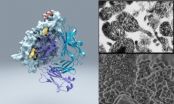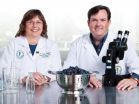(Press-News.org) This news release is available in French.
A drug given to pregnant mice with models of autism prevents autistic behavior in their offspring, a new report shows, and though the drug could not be administered prenatally in humans (there is no way to screen for autism in human fetuses), clinical trials of this drug administered later in development, in young children who have already developed autistic symptoms, are showing progress.
The causes of autism spectrum disorder, or ASD, are complex and not well understood.
Prolonged excitation of brain neurons seems partly to blame. Thus, GABA -- the main inhibitory neurotransmitter in the brain -- has drawn attention; GABA typically excites neurons in the brain of a growing fetus and then quiets them during birth, a switch mediated by oxytocin from the mother, and one that has a protective effect during the vulnerable birthing process.
But in autism, this switch doesn't happen. The neurons remain excited. This is because chloride – a key signaling molecule -- builds to higher concentrations than it should inside neurons.
In a 2012 clinical trial in which a chloride-lowering drug was administered to more than 50 three- to eleven-year olds with autism or Asperger syndrome, the drug, bumetanide, was shown to reduce the severity of both autism and Asperger syndrome, with few side effects.
Now, to better understand if bumetanide affects the cellular processes that underlay the GABA switch in the way they believed it did (by lowering chloride levels), and to determine whether restoring the switch alone could reduce autistic symptoms, Roman Tyzio and colleagues (several of whom were involved in the clinical trial) studied two rodent models of the disorder -- one caused by a gene and one caused by an environmental factor (namely, exposure to a drug called valproate in utero).
Oxytocin didn't signal from mother to baby in either rodent model, the researchers found, and as a result, chloride built to higher concentrations than it should have inside fetal neurons. By injecting the mothers with bumetanide, however, the researchers were able to reduce chloride levels to their appropriate amount -- and in turn, to restore the GABA switch mechanism (it went from excitatory to inhibitory, as expected).
Critically, offspring exposed to this treatment (administered one day before delivery) didn't demonstrate traits of autism.
"This study validates the clinical trials using bumetanide to reduce chloride and restore strong GABAergic inhibition in humans with autism," said the study's senior author, Yehezkel Ben-Ari, of Aix-Marseille University in France and Inserm Emeritus Research Director at the Mediterranean Institute of Neurobiology. He is referring to the 2012 clinical trial done in more than 50 young children. Now, additional clinical trials with this drug are being pursued in Europe. 'This is one of the most promising clinical strategies for ASD currently available,' Dr. Ben-Ari said.
"The observation that a single treatment of the mother before delivery prevents the expression of … features of autism in offspring illustrates the importance of conditions at delivery," he added, "and the amazing long-term priming consequences of a wrong start." In other words, chloride levels during delivery appear to need to be low.
Together, the work of Ben-Ari and colleagues suggests that abnormal chloride levels may cause the defective GABA switch associated with autism, and that these chloride levels may be treatable beyond infancy.
"I think that an early diagnosis of ASD coupled with a drug such as bumetanide or other regulators acting to reduce aberrant brain activities that perturb neuronal activities are likely future therapies," Dr. Ben-Ari said.
He added that communicating with a child suspected to have autism as early as possible is important, too. "Behavioral treatments might be reinforced by these pharmaceutical treatments and might facilitate their success, restoring communication with the child at an early age."
INFORMATION:
This study received funding from Neurochlore, a company focused on the treatment of developmental disorders.
The American Association for the Advancement of Science (AAAS) is the world's largest general scientific society, and publisher of the journal, Science as well as Science Translational Medicine and Science Signaling. AAAS was founded in 1848, and includes 261 affiliated societies and academies of science, serving 10 million individuals. Science has the largest paid circulation of any peer-reviewed general science journal in the world, with an estimated total readership of 1 million. The non-profit AAAS is open to all and fulfills its mission to "advance science and serve society" through initiatives in science policy, international programs, science education, and more. For the latest research news, log onto EurekAlert!, www.eurekalert.org, the premier science-news Web site, a service of AAAS. END
Reduce the chloride to restore the switch
A drug affecting chloride levels improves autistic-like behavior in offspring of mouse models of autism
2014-02-06
ELSE PRESS RELEASES FROM THIS DATE:
The ultimate decoy: Scientists find protein that helps bacteria misdirect immune system
2014-02-06
LA JOLLA, CA—February 6, 2014—A team led by scientists at The Scripps Research Institute (TSRI) has discovered an unusual bacterial protein that attaches to virtually any antibody and prevents it from binding to its target. Protein M, as it is called, probably helps some bacteria evade the immune response and establish long-term infections.
If follow-up studies confirm Protein M's ability to defeat the antibody response, it is likely to become a target of new antibacterial therapies. The protein's unique ability to bind generally to antibodies also should make it a valuable ...
Decoding dengue and West Nile: Researchers take steps toward control of health proble
2014-02-06
ANN ARBOR—Dengue fever and West Nile fever are mosquito-borne diseases that affect hundreds of millions of people worldwide each year, but there is no vaccine against either of the related viruses.
A team of scientists at the University of Michigan and Purdue University has discovered a key aspect both to how the viruses replicate in the cells of their host and how they manipulate the immune system as they spread.
In a study scheduled for online publication Feb. 6 in the journal Science, researchers led by Janet Smith of the U-M Life Sciences Institute describe for ...
Autism: Birth hormone may control the expression of the syndrome in animals
2014-02-06
This news release is available in French.
The scientific community agrees that autism has its origins in early life—foetal and/or postnatal. The team led by Yehezkel Ben-Ari, Inserm Emeritus Research Director at the Mediterranean Institute of Neurobiology (INMED), has made a breakthrough in the understanding of the disorder. In an article published in Science, the researchers demonstrate that chloride levels are elevated in the neurons of mice used in an animal model of autism, and remain at abnormal levels from birth. These results corroborate the success obtained ...
Opening 'the X-files' helped researchers to understand why women and men differ in height
2014-02-06
Researchers from the University of Helsinki analyzed thoroughly the commonly occurring genetic variation in chromosome X, one of the two sex-determining chromosomes, in almost 25,000 Northern European individuals with diverse health-related information available. The aim of the study was to find genetic factors that could explain individual differences in several traits, including BMI, height, blood pressure and lipid levels. In addition, the researchers also investigated whether the X chromosome would contribute to some of the well-known differences between men and women ...
Theorists predict new forms of exotic insulating materials
2014-02-06
CAMBRIDGE, Mass-- Topological insulators — materials whose surfaces can freely conduct electrons even though their interiors are electrical insulators — have been of great interest to physicists in recent years because of unusual properties that may provide insights into quantum physics. But most analysis of such materials has had to rely on highly simplified models.
Now, a team of researchers at MIT has performed a more detailed analysis that hints at the existence of six new kinds of topological insulators. The work also predicts the materials' physical properties in ...
Researchers pinpoint protein associated with canine hereditary ataxia
2014-02-06
Researchers from North Carolina State University have found a link between a mutation in a gene called RAB 24 and an inherited neurodegenerative disease in Old English sheepdogs and Gordon setters. The findings may help further understanding of neurodegenerative diseases and identify new treatments for both canine and human sufferers.
Hereditary ataxias are an important group of inherited neurodegenerative diseases in people. This group of diseases is the third most common neurodegenerative movement disorder after Parkinson's and Huntington's diseases.
In people with ...
Nutritional supplement improves cognitive performance in older adults, study finds
2014-02-06
Tampa, FL (Feb. 6, 2014) – Declines in the underlying brain skills needed to think, remember and learn are normal in aging. In fact, this cognitive decline is a fact of life for most older Americans.
Therapies to improve the cognitive health of older adults are critically important for lessening declines in mental performance as people age. While physical activity and cognitive training are among the efforts aimed at preventing or delaying cognitive decline, dietary modifications and supplements have recently generated considerable interest.
Now a University of South ...
Immune system 'overdrive' in pregnant women puts male child at risk for brain disorders
2014-02-06
Johns Hopkins researchers report that fetal mice — especially males — show signs of brain damage that lasts into their adulthood when they are exposed in the womb to a maternal immune system kicked into high gear by a serious infection or other malady. The findings suggest that some neurologic diseases in humans could be similarly rooted in prenatal exposure to inflammatory immune responses.
In a report on the research published online last week in the journal Brain, Behavior and Immunity, the investigators say that the part of the brain responsible for memory and spatial ...
Source of chlamydia reinfections may be GI tract
2014-02-06
The current standard of care treatment for chlamydia sometimes fails to eradicate the disease, according to a review published ahead of print in Infection and Immunity, and the culprit may be in the gut.
Chlamydia trachomatis not only infects the reproductive tract, but abides persistently—though benignly—in the gastrointestinal tract. There it remains even after eradication from the genitals by the antibiotic, azithromycin, says first author Roger Rank, of the Arkansas Children's Research Institute, Little Rock. And that reservoir is likely a source of the all-too-common ...
Scientific review points to supplement users engaging in a pattern of healthy habits
2014-02-06
Washington, D.C., February 6, 2014—Dietary supplement users take these products as just one component of a larger effort to develop a healthier lifestyle, according to a newly published review in Nutrition Journal, a peer-reviewed scientific publication. The review, "Health Habits and Other Characteristics of Supplement Users" (Nutrition Journal.2014, 13:14), co-authored by Council for Responsible Nutrition (CRN) consultant Annette Dickinson, Ph.D., and CRN's senior vice president, scientific and regulatory affairs, Duffy MacKay, N.D., examined data from 20 peer-reviewed ...
LAST 30 PRESS RELEASES:
Newly discovered bacterium converts carbon dioxide into chemicals using electricity
Flipping and reversing mini-proteins could improve disease treatment
Scientists reveal major hidden source of atmospheric nitrogen pollution in fragile lake basin
Biochar emerges as a powerful tool for soil carbon neutrality and climate mitigation
Tiny cell messengers show big promise for safer protein and gene delivery
AMS releases statement regarding the decision to rescind EPA’s 2009 Endangerment Finding
Parents’ alcohol and drug use influences their children’s consumption, research shows
Modular assembly of chiral nitrogen-bridged rings achieved by palladium-catalyzed diastereoselective and enantioselective cascade cyclization reactions
Promoting civic engagement
AMS Science Preview: Hurricane slowdown, school snow days
Deforestation in the Amazon raises the surface temperature by 3 °C during the dry season
Model more accurately maps the impact of frost on corn crops
How did humans develop sharp vision? Lab-grown retinas show likely answer
Sour grapes? Taste, experience of sour foods depends on individual consumer
At AAAS, professor Krystal Tsosie argues the future of science must be Indigenous-led
From the lab to the living room: Decoding Parkinson’s patients movements in the real world
Research advances in porous materials, as highlighted in the 2025 Nobel Prize in Chemistry
Sally C. Morton, executive vice president of ASU Knowledge Enterprise, presents a bold and practical framework for moving research from discovery to real-world impact
Biochemical parameters in patients with diabetic nephropathy versus individuals with diabetes alone, non-diabetic nephropathy, and healthy controls
Muscular strength and mortality in women ages 63 to 99
Adolescent and young adult requests for medication abortion through online telemedicine
Researchers want a better whiff of plant-based proteins
Pioneering a new generation of lithium battery cathode materials
A Pitt-Johnstown professor found syntax in the warbling duets of wild parrots
Cleaner solar manufacturing could cut global emissions by eight billion tonnes
Safety and efficacy of stereoelectroencephalography-guided resection and responsive neurostimulation in drug-resistant temporal lobe epilepsy
Assessing safety and gender-based variations in cardiac pacemakers and related devices
New study reveals how a key receptor tells apart two nearly identical drug molecules
Parkinson’s disease triggers a hidden shift in how the body produces energy
Eleven genetic variants affect gut microbiome
[Press-News.org] Reduce the chloride to restore the switchA drug affecting chloride levels improves autistic-like behavior in offspring of mouse models of autism


